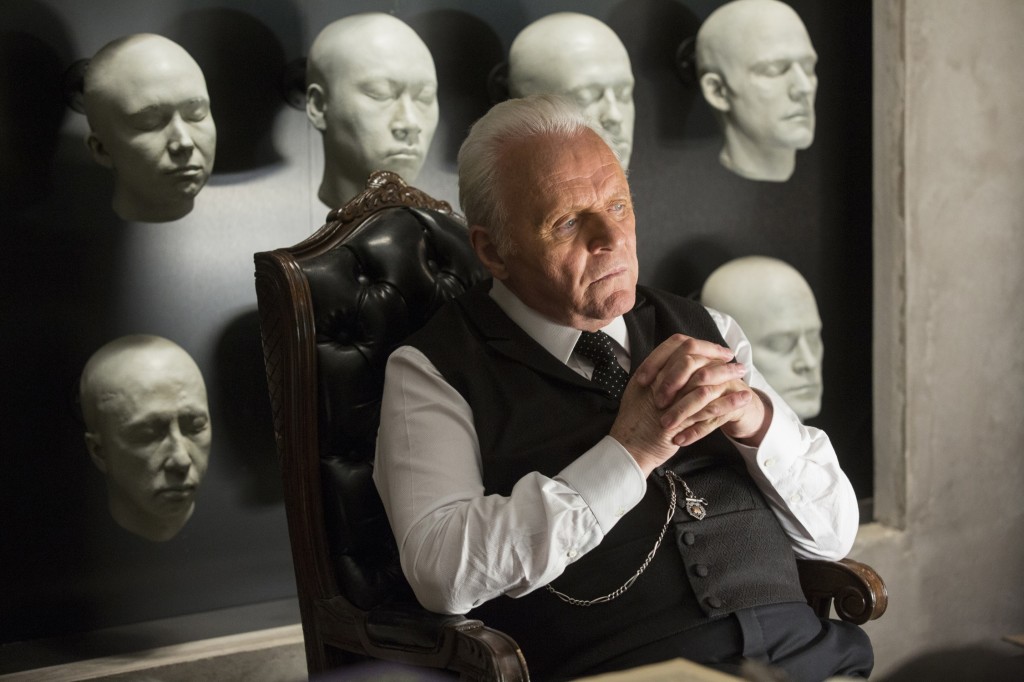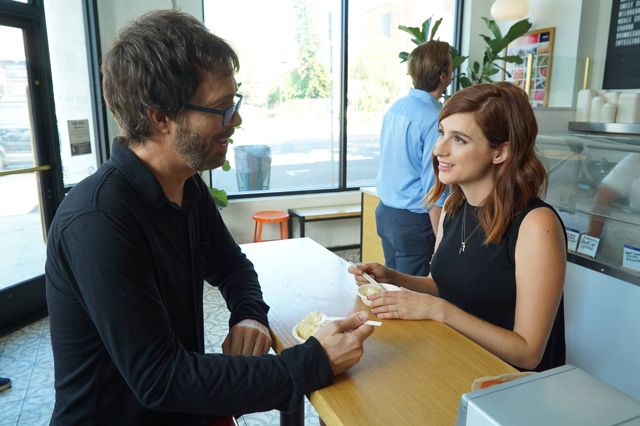Deadshirt Is Watching…is a weekly feature in which Deadshirt staff, contributors, and guests sound off on the television shows we’re tuned into, from intense dramas to clever sitcoms to the most insane reality shows. This week: Westworld and You’re The Worst!
Joe Stando is watching…
Westworld
Season 1, Episode 3, “The Stray”
HBO
Westworld is a confounding show so far. On the one hand, it’s an incredibly interesting, immersive concept. It’s a series written to be discussed at length, on fan theory sites and around the water cooler at work. It explores the nature of consciousness and humanity in a way reminiscent of Dollhouse or AMC’s Humans, but much more competently and with fewer punches pulled. On a purely cerebral, intellectual level, it’s among the best shows on television right now.
On the other hand, it’s mostly failed thus far to draw any kind of strong emotional response from me, or any deep empathy for its characters. The synthetic hosts within the park are killed and resurrected every day, which tends to limit our emotional investment in their well-being. The human scientist characters are generally not in any physical danger (although a couple of them faced some mild peril this week that I imagine is a sign of things to come), and their conflicts are dryly ideological. It’s a show with a ton of great, eerie performances, but few memorable or engaging characters.
This week was a particularly strong example of the frustrating duality of the series. “The Stray” featured a ton of interesting, sinister moments, like Teddy’s ominous, newly implanted memories of the villainous Wyatt, or the brutal attack on the posse by the mysterious “Wise Men.” In moments like this, or Ford’s brief eulogy of his partner, Arnold, the series shines. But the dramatic personal beats, like Bernard’s grief over the loss of his son, fall flat. His awareness and guidance of Dolores’ growing consciousness is interesting, but even that feels more like setup than anything with a meaningful impact here.
I’m charmed enough by the premise and production values of Westworld to be in for at least the first season. (I realized the other day that, amazingly enough, it’s the one show I’d actually enjoy a Talking Dead-stye follow-up to. Riffing on the concept of Westworld is endlessly funny to me.) I also have a feeling that as the season goes on, the slow burn will heat up and the character-driven elements will take on new and deeper resonance. But for now, as good a time as I’m having, I’m calling it a good show trying to become a great one.
Episode Highlight: It feels like a cop-out to give it to Anthony Hopkins, who’s been given what’s easily the most interesting material to work with. But he shined nonetheless in this episode, which gave him an interesting contrast to the previous weeks. Thus far, Ford has seemed almost romantic about Westworld and the hosts, delivering monologues about the human spirit and potential to smarmy coworkers and small children. This week made him a bit harsher, scarring a deactivated host to prove a point and seeming almost spiteful in his interaction with a safe-mode Teddy. Ford cares deeply about Westworld and the possibilities it has, but he has no illusions about his creations, unlike the more optimistic Bernard. Runners-up for best of this week were the odd couple pairing of Ashley (Luke Hemsworth) and Elsie (Shannon Woodward) out in the park, and the neat editing tricks during Dolores’ glitchy flashbacks.
Chuck Winters is watching…
You’re the Worst
Season 3, Episode 7, “The Only Thing That Helps”
FXX
At this point last year, You’re the Worst rolled out “There Is Not Currently a Problem,” the episode where Gretchen’s depression came roaring to the forefront of the show, snapping the season into relief and dictating its tone for the second half. “The Only Thing That Helps” takes a similar tack here as several characters cross thresholds that they can’t easily walk back: Lindsey finally guilts Paul into letting her cuckold him, Edgar gets a pot card against the strenuous (and heartless) objections of his VA caseworker, and Jimmy, well…
Jimmy’s issues with his father was always destined to resurface; the ending of “Men Get Strong” wasn’t subtle about that. It sure didn’t seem like they were going to come up like this, though: As soon as Jimmy looked inside the box that was delivered to him and immediately tossed it outside, I knew it had to be his father’s ashes. (Big ups to Aya Cash in this scene; Chris Geere’s petulant avoidance of the issue carried the day, but it was Cash’s hilariously childish reactions that launched the scene into the comic stratosphere.)
Of course, when you unexpectedly get your father’s ashes by mail, you can keep them around and constantly talk to them as you write as if that proves you’re not affected by him. Once that starts to unnerve your girl, though, then you gotta have a funeral for the man so you can close the book on him once and for all. Jimmy, determined to prove that his father doesn’t have a hold over him, agrees to something quick: have a few friends over, say a few heckles in place of a eulogy, dump his ashes down the toilet, and go back to work.
This all goes to hell when Ronnie Overly’s friend Freddie asks to say a few words at the memorial. Jimmy lets him, hoping this means he won’t have to do a eulogy he doesn’t feel like giving, but it turns out that Freddie was just looking to recite something written by Ronnie for the memorial; he forgives Jimmy for shutting him out and claims responsibility for turning Jimmy into a writer. Jimmy’s ensuing explosion gives Chris Geere a chance to play a big moment like his leading lady had in “There Is Not Currently a Problem,” and he utterly kills it.
That’s not to say that it’s all melodrama; in fact, “The Only Thing That Helps” does an even better job than most “heavy” episodes of underlining the dramatic tension with absurd levity. In his impotent rage, Jimmy fetches the list of heckles he planned to read—up to now a reliable source of humor at Jimmy’s expense—and his thunderous, wounded recitation of them to almost no reaction from his audience is sad and almost pathetic. At the same time, though, Vernon Barbara is there, and his continued love of Jimmy’s heckles is a joy to behold. Ben Folds is also there (he’s Gretchen’s newest client; more on him in a little bit), volunteering to play piano for tips and Instagram tags, and the way he underscores Jimmy’s sad heckles and furious movements with little piano ditties is hysterical without ever taking away from the drama of the scene.
But it’s Jimmy’s episode all the way, and his last moment—trying to dropkick his father’s ashes into Tony Shaloub’s front yard (as per his wishes), claiming “You do not get to affect me anymore,” only to be covered in the ash upon impact—sets the stage for a second half about a man trying desperately to make peace with a deep pain he’s never had to address. Last season, Jimmy was able to pull it together and help Gretchen through a dark time. Now it looks like we’ll get to see if Gretchen can do the same for him.
Episode Highlight: Ben Folds by a mile. Folds has always been a good sport about himself (to that end, his constant surprise that “Brick” isn’t as mysterious as he thinks it is was a great gag), but cheers to him and the writers for coming up with (and playing to) a refreshing take on the “famously nice celebrity is really kind of an asshole” cliche.
Or maybe I’m just thinking of Ben Kweller. After all, Ben Folds is just a regular guy from North Carolina who plays piano and smokes a pretty good pork shoulder.
That’s what we’ve been watching this week. What are you tuned into? Let us know in the comments, post on our Facebook page, or tweet us @DeadshirtDotNet!



